Yeovil Celebrates the 1902 Coronation
The 1902 Coronation
How Yeovil celebrated the coronation of King Edward VII and Queen Alexandra
The coronation of Edward VII and his wife Alexandra as King and Queen of the United Kingdom and the British Empire took place at Westminster Abbey, London, on 9 August 1902. Originally scheduled for 26 June of that year, the ceremony had been postponed at very short notice because the King had been taken ill with an abdominal abscess that required immediate surgery.
The preparations, subsequent partial cancellation and eventual coronation celebrations in Yeovil are described here from the diaries of Louisa Harris.
|
From the
diary of
Louisa
Harris .... "20 January 1901: Grave anxiety is at present rife on account of the illness or our loved and honoured sovereign." "22 January 1901, 10pm: Our beloved Queen passed away at 6:30pm. The empire is in mourning." "23 January 1901: Everywhere are signs of mourning flags at half-mast - muffled peals and the minute bell." "24 January 1901: The new King proclaimed as Edward VII in London this day." "31 January 1901: Edward VII proclaimed in Yeovil this day [see Gallery] amidst every manifestation of loyalty such as bell ringing, bands playing, flags flying etc. Of course the ceremony was as quiet a one as it could well be under the circumstances of mourning for the lamented Queen."
"2
February
1901:
Funeral
of our
much
lamented
Queen.
Pa and
Emmie
[Louisa's
sister]
have
gone to
the
memorial
service
at
St
John's
which is
being
attended
by all
the
public
bodies,
the
Volunteers,
etc.
This
afternoon,
too,
memorial
services
are
being
held at
all the
other
places
of
worship
as well.
The
Volunteers
previously
met in
the
Borough,
went
through
military
movements
and
played
the
Dead
March in
Saul.
It
sounded
very
impressive
as have
the
muffles
peals of
the
minute
bell.
Later.
After
service
there
was more
playing
of the
Dead
March in
the
Borough
etc." "5 June 1902: This has been another eventful day in the annals of the town. King Lew Aniea [sic - actually Litunga Lewanika (1842-1916), King of Barotseland (1878-1916), now the western part of Zambia] from S. Africa (one of the invited guests to our King's Coronation, etc. and now staying at Marston Magna, a village near, with the gentleman, a native of these parts, who brought him over) paid a visit here this day [see Gallery]. He was given quite an ovation - shown the printing works etc. and received officially by the Mayor, Town Councillors and others. He carried away some souvenirs of Yeovil that were presented to him. They all saw him but me - I didn't care to go because of the crush [Louisa was confined to a wheelchair]." "14 June 1902: We are having most unseasonable weather, some days as cold as it was in December. It is said that there has not been such a June for more than two hundred years. It is causing much anxiety on account of the Coronation which is to take place on 26th July, 27th to be a day of national festivity as well." "23 June 1902: Everything now seems to augur well for the Coronation - the weather has completely changed, and is just glorious, preparations are going on apace. From my window I can see them building the Beacon fire on Summer House Hill.." "24 June 1902: This afternoon the town has been thrown into a state of consternation by the receipt of a telegram that the King is seriously ill and has today undergone an operation in his stomach hence the Coronation has been indefinitely postponed, terrible news indeed, it was known that he had been ailing, but nothing alarming was apprehended. Later: - a telegram has been received that the King is better and that his wish is that the festivities shall take place on 26th and 27th as arranged, in the provinces, though they are bound to be postponed in London, in consequence of the Coronation having to be deferred." "25 June 1902: Telegrams have come stating that the King passed a good night and is doing as well as can be expected. Preparations are actively going forward. The town is being decorated and prepared for illumination on a very elaborate scale, but over all there seems to rest a cloud on account of the King's illness, and somehow no-one can feel like rejoicing. I went out this evening to view the decorations which had already been prepared, the rest have ceased to be proceeded with, it having been wisely determined in common with most other places, not to carry out the day's programme on the festival lines that had been arranged. The public luncheon, old folks' and children's teas will take place, but there will be no processions, firing, bell ringing, bonfire or anything so out of keeping with the King's serious illness. He has undergone a most serious operation in the stomach and will not be out of danger for some days. Who could rejoice under these circumstances. Of course the holidays cannot be conveniently stopped, and the feeds have to take place to prevent waste." "26 June 1902: This morning instead of the Thanksgiving services intended, intercessional services were held. The children had their tea in the afternoon and after all these were bands both at the Luncheon and children's treat - I suppose on account of the satisfactory progress of the King." "27 June 1902: Today what was left undone in the matter of decorations have been completed in most instances, and most of the detail in the original programme for the day has been carried out, I presume on account of the continued satisfactory progress of the King. Tonight the Sidney Gardens, public buildings, most of the business houses and shops, as well as many private houses, are beautifully and most tastefully illuminated. My sisters and I went round to view the illuminations." "30 June 1902: The King is progressing most satisfactorily. On Saturday night some person or persons wantonly set fire to the bonfire on Summer House Hill. A reward of 5 pounds has been offered to anyone who will give information that will lead to the discovery of the offender or offenders. However, a new bonfire was specially built today, and somewhere after 9pm a procession, consisting of cyclists and others in masquerade arrived, with volunteers, etc. and headed by the V[olunteer] Band was formed in Hendford and wended its way to the Hill where after a goodly flight of rockets and other fireworks and the singing of the National Anthem the bonfire was set ablaze. Before leaving the hill too, the Band played and the people sang the National Anthem. All this was done to celebrate the King's recovery, and the blaze was in unison with all other bonfires throughout the country." 9 August 1902: The coronation came off all right this day. It was celebrated in Yeovil by Divine Service in the Church yard in the morning, sports in the afternoon, a cycle parade etc. in the evening, with the addition of Bands playing, both singing and anvils [sic] firing all day. There was a plentiful display of bunting, but none of the elaborate decorations and illuminations of the original programme; other details, too, were left out. Lucy Parsons came to tea, and with her we four went out to see the cycle parade. In the morning, too, she went with Bessie and Maud [Louisa's sisters] to the service in the churchyard."
|
gallery
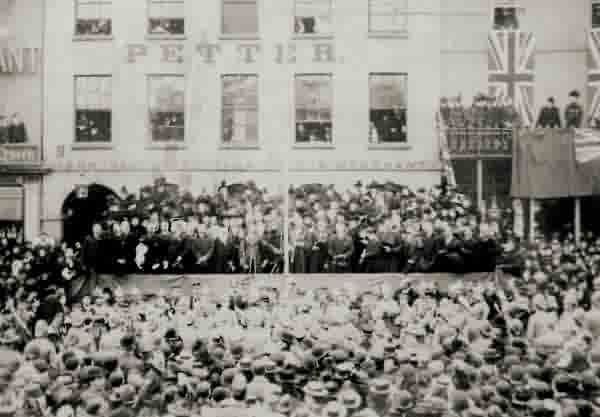
The Proclamation of King Edward VII in the Borough on 31 January 1901.
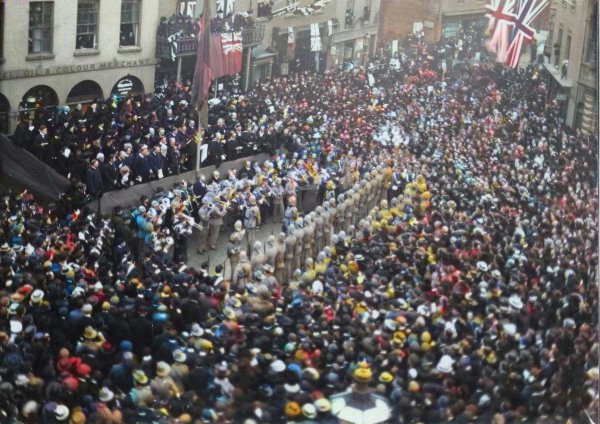
From the Stiby
Collection
(colourised).
Courtesy of South Somerset Heritage Collection
.... and the crowd in the Borough seen from a different angle.
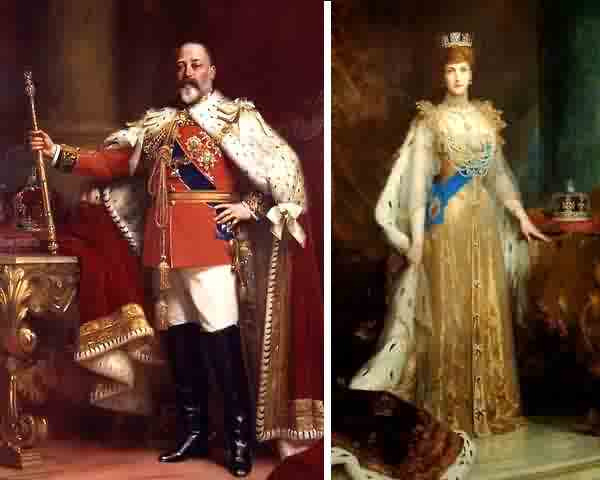
Edward VII and Alexandra painted in their coronation robes by Luke Fildes.
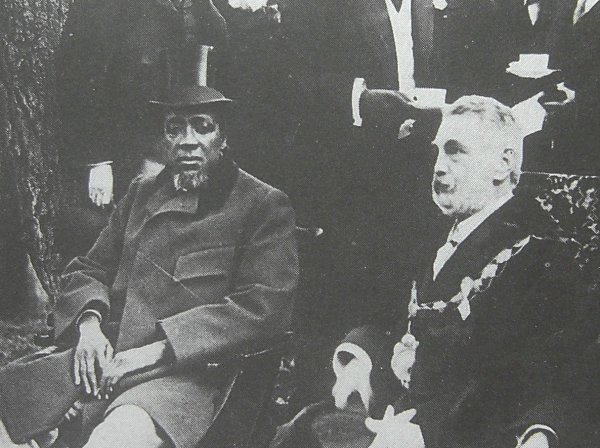
Mayor Sidney Watts and Litunga Lewanika (1842-1916), King of Barotseland (1878-1916) - now the western part of Zambia - at the Mansion House on 5 June 1902. The king was in England to attend the coronation of Edward VII but while in Yeovil he laid the foundation stone of the new Western Gazette building.
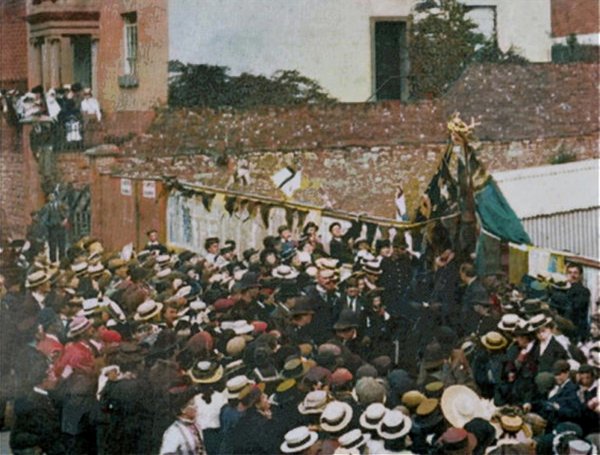
King Litunga Lewanika of Barotseland (in silk top hat, just below and slightly to the left of the flags) performs the foundation ceremony of the new Western Gazette building in June 1902. At the top of this colourised photograph is Osborne House.
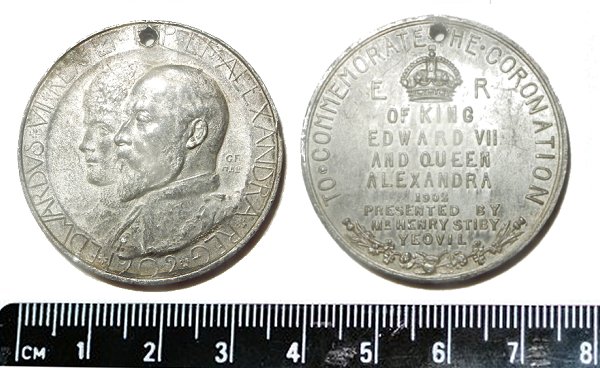
The above scarce commemorative medallion in my collection was given by Henry Stiby, later Mayor of Yeovil, to school children to commemorate the coronation of King Edward VII (reigned 1901-1910) and Queen Alexandra.
The medallion is 35mm in diameter and 2.5mm thick. The obverse carries profile portraits of the king and queen with "EDWARDUS VII REX ET IMP ET ALEXANDRA REG. 1902" around the edge. The reverse carries the edge inscription "TO COMMEMORATE THE CORONATION" and a central inscription reading "OF KING EDWARD VII AND QUEEN ALEXANDRA" over "1902 PRESENTED BY MR HENRY STIBY YEOVIL" below a royal crown motif between "ER". The edge is plain.
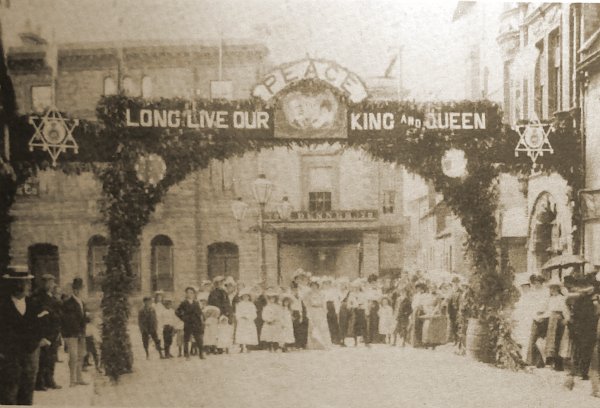
This photograph looks along High Street to Hendford - the triumphal arch was the highlight of the town's decorations of the 1902 coronation of King Edward VII and Queen Alexandra. In the background at left is Stuckey's Bank and at centre is Lindsay Denner's "gentleman's and juvenile ready-made and outfitting establishment". Note to its immediate right the very narrow entrance to Porter's Lane. Stuckey's bank was later demolished and the present Westminster bank was opened in today's building in 1919. Denner's building was also demolished and Porter's Lane was widened to become Westminster Street.
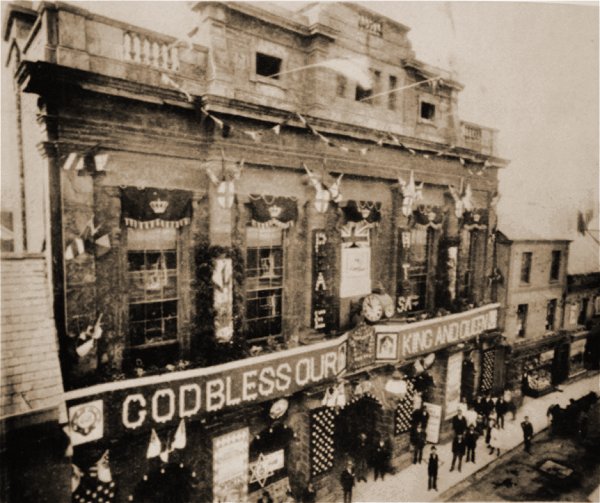
The Town Hall photographed in 1902 when it was decorated to celebrate the coronation of King Edward VII and Queen Alexandra.
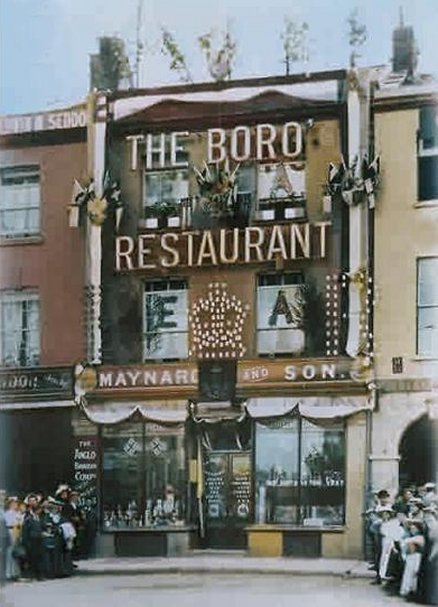
The Borough Restaurant displays its decorations for the coronation of King Edward VII and Queen Alexandra in 1902.
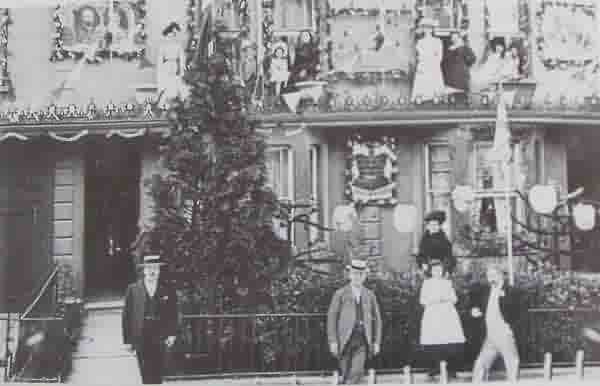
62 South Street (which still survives) decked out with flags and bunting for the Coronation of King Edward VII and Queen Alexandra.